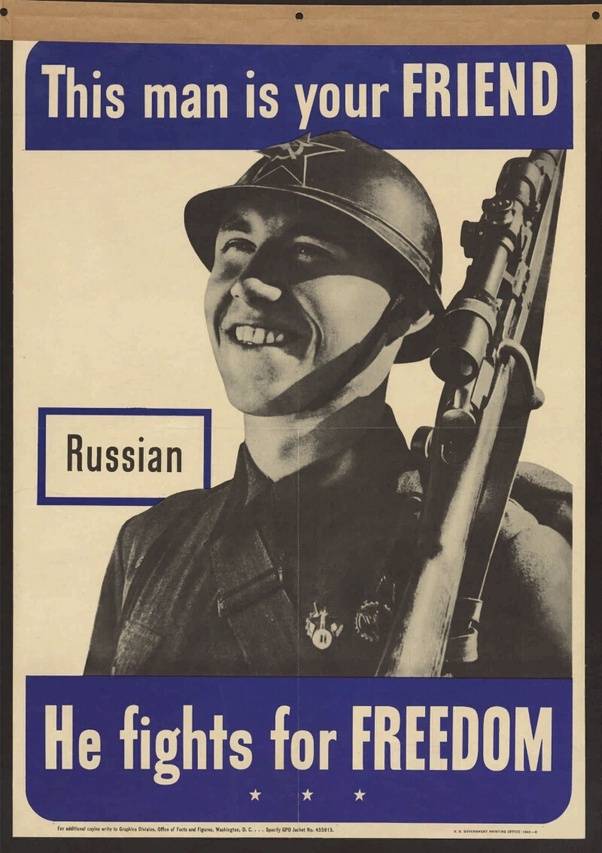American-Russian relations deteriorated after the October Revolution, normalized, transitioned to an outright alliance against a common enemy in 1941, then went bad for good after WWII.
So it might be tempting to argue that in an alternate timeline with no communist revolution and no Soviet Union, the adversity wouldn’t have happened. But logically, if the adversity had that much to do with communism, then logically relations should have improved at the end of the Soviet era. But they didn’t. Bilateral relations don’t happen in a vacuum, so saying “If Russia did this or that differently” is only part of the story. Looking at past history, an observer would expect the USA to withdraw from Europe in 1945 as they had after WWI. But the circumstances had changed, and probably for the worse.
After World War II the British were enormously indebted to the USA, and also lost their empire. To large extent the USA absorbed the interests and positions of their former enemy. This included having a stake, or at least a perceived stake, in European affairs. It was a hostile and awkward relationship, but ultimately western Europe accepted servility to the USA in exchange for it taking up most of the cost of their anti-Russian interests. The USA benefited from this new system of financial and political domination. American voters, despite being historically isolationist, didn’t complain as a small fraction of the newly found immense wealth trickled down to them. The new American suburbia was in fact more prosperous than anything else in the world at that time.
I can’t say I understand the mindset of someone who sees most of the world destroyed with tens of millions dead and immediately wanting to leap into another war with former allies, but this is the choice Americans made that doomed the human race to at least another century of bloody conflicts.
Ian Kummer

All text in Reading Junkie posts are free to share or republish without permission, and I highly encourage my fellow bloggers to do so. Please be courteous and link back to the original.
I now have a new YouTube channel that I will use to upload videos from my travels around Russia. Expect new content there soon. Please give me a follow here.
Also feel free to connect with me on Quora (I sometimes share unique articles there).



A hard question.
I used to think that the end of the Cold War and the Berlin Wall would enable public discussion/debate about political economy without being overshadowed by geopolitical and ideological (totalitarian communism) loyalty demands. The opposite happened: All discussion died out, neo-Liberal there-is-no-alternative and the End of History liberalism reigned uncontested. It was as if all prior discussion was only to stave off the competition of socialist ideals.
In the eighties I lost a job at a consultancy firm because I stated that the whole managerial hype would pass and that management was not a scientific discipline but largely the application of solid communications skills, intermediation, and common sense. In 2008 with the GFC I thought that finally the MBA would become a hated caste in society, but again I was wrong. Trends are hard to predict.
We often forget when opposing Liberalism to Communism and Fascism that Britain had a key role in encouraging a war between German & Russia, that France and Britain had plans to invade Russia through the Caucus prior to Hitler’s invasion of France, and the Anglos hated Russia even before the October Revolution. In fact the Americans joined the fray in 1918 in Russia, and managed in WW1 and WW2 to delay involving themselves until the spoils of victory presented themselves. The West was much more anti-Russia and anti-communist than it was ever anti-Fascist.
Western interests were deathly afraid of any opposition to bourgeois “private property”, of workers’ unions, and in the thirties, of depression and increasing galvanizing of the working class against the powers that be. The accommodations FDR made to the working poor & employment were to appease even worse outcomes, including outright socialism. The Allies were so afraid of a return to the Depression Era after the war that they insisted on the “Open Door” free trade policy, and this more than any other factor prompted Truman to drop the bomb to keep the Soviets & communism at bay. Churchill was already preoccupied with Soviet power & influence months before the end of ww2.
In view of these forces, the notion Russia & America could have had a different relationship if ideology were not in play is purely theoretical. The dynamic of Western or Anglo-American culture is above all to seek dominion and to dominate, whether this is with regard to nature, human nature, you own society, the natives, or the rest of the globe. The imperial will-to-power pretty much dooms peaceful co-existence, regardless the cultural sublimations used to legitimize that quest.